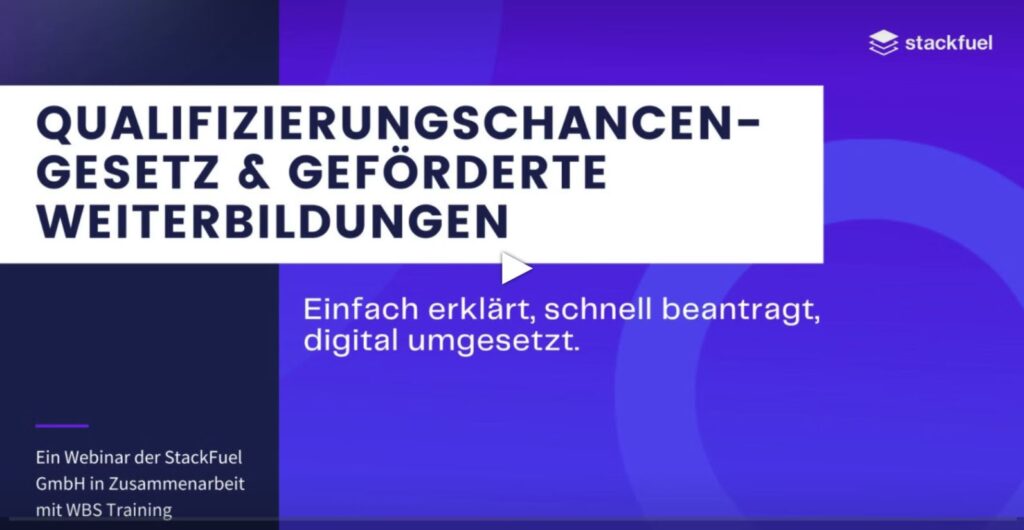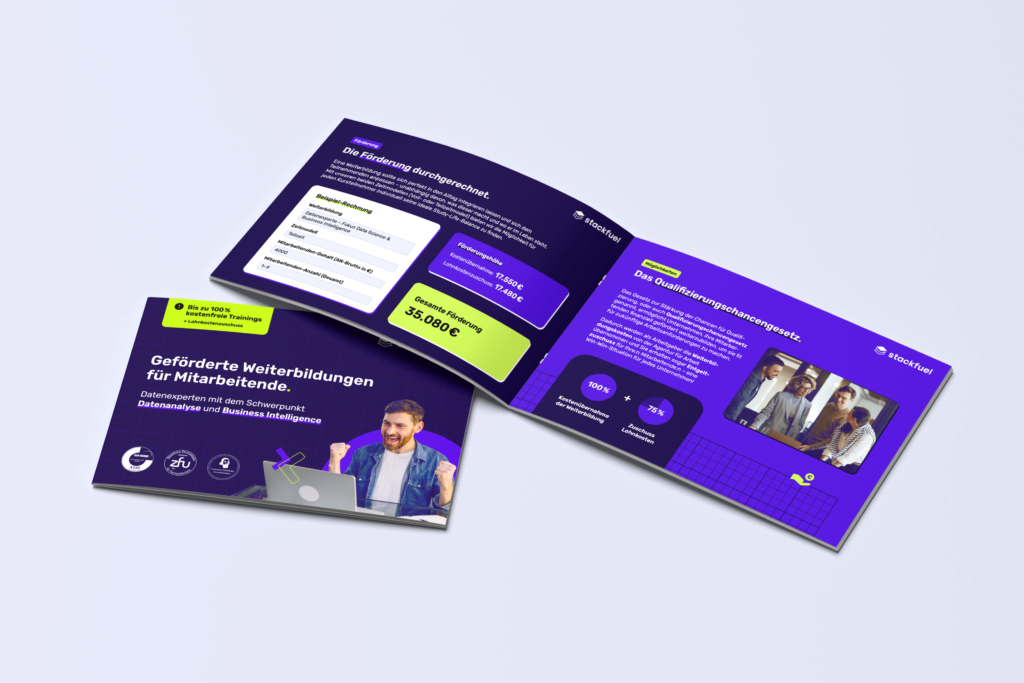Whether employee or employer: the Qualification Opportunities Act promotes further training for both sides in order to secure jobs and gain competitive advantages. Find out now what requirements must be met and how you can get up to 100% of the costs funded.
Promotion with the QCG: Opportunities in the digital transformation
The Qualification Opportunities Act (QCG) has been in place since 2019 and is intended to help employees and employers build up new knowledge in order to take advantage of digital change as an opportunity.
This also distinguishes the QCG from the education voucherWhile this is primarily intended to secure jobs or get unemployed people back into work, the Qualification Opportunities Act is geared towards employees and their employers. The Qualification Opportunities Act is aimed at employees who want to develop new skills in order to understand and apply new technologies and trends and at employers who want to secure or expand their position on the market with their team using new expertise.
"By 2025, around 1.3 million jobs will disappear due to automation and technological progress, but 2.1 million new jobs will be created at the same time. Our task is to ensure that the workers of today can also do the work of tomorrow",
declared Hubertus Heil, Federal Minister of Labor and Social Affairs, in a speech on the Qualification Opportunities Act.
The advantages of the Qualification Opportunities Act are obvious:
- Qualify staff in a cost-saving way
- Funding of up to 100 percent of further training costs
- Wage supplements
- A diverse range of further training courses
- Increase employee motivation
Find out in 1 minute.
Subject areas for qualification via the Qualification Opportunities Act
The most important prerequisite is that the subject of your desired further training is future-oriented, i.e. it doesn't just teach you skills that are necessary for your current job anyway.
The promotion of the Qualification Opportunities Act is therefore not strictly limited in terms of subject matter. Even training courses for people who have not yet obtained a qualification are eligible for funding.
However, the focus is naturally on further training courses that focus on current digitalization topics and make employees and employers fit for structural change and new markets. The courses offered by StackFuel, for example, revolve entirely around the "data" megatrend and are eligible for funding under the Qualification Opportunities Act, for example as a Data Scientist or as Python Programmer.

Tip: Online further training can also be funded under the Qualification Opportunities Act! Book a free Consultation with us and find out about your options.
Scope of further training via the Qualification Opportunities Act
The Qualification Opportunities Act stipulates that at least 120 hours must be invested in further training. However, this duration does not have to be consecutive, but can also extend over longer periods and several shorter training periods.
Longer periods are also particularly worthwhile: as the Qualification Opportunities Act also subsidizes wage costs, for example, the funding can be used more effectively if the duration of the further training is longer. This means that vocational qualifications can also be funded and made up for without having to bear additional costs or forego salary.
Qualification Opportunities Act: background, objectives and requirements
The Qualification Opportunities Act is part of the so-called Qualification offensive. On 1 January 2019, it replaced the previous WeGebAU program and created a broader range of funding for more people. In 2024, the current federal government amended the law once again and simplified access to funding. You can find out more about this below.
The aim of the Qualification Opportunities Act is to make employers and employees fit for digitalization. By promoting further training opportunities and subsidizing wage costs, the willingness to systematically acquire new skills is increased. This is also intended to prevent unemployment due to structural change and secure the supply of skilled workers.
The requirements for funding are relatively low:
- The Qualification Opportunities Act is only aimed at employees.
- The content of the qualification must be future-oriented.
- The scope of the qualification must comprise at least 120 hours.
- The last comparable further training must have taken place at least two years ago.
- The training provider and the training program must be AZAV-certified.
Certification in accordance with AZAV means that the provider and offer have been tested and meet the requirements of the "Accreditation and Approval Ordinance for Employment Promotion". This also ensures the quality of the training.

What roles do employees and employers have in the promotion via the QCG?
According to the Qualification Opportunities Act, all future-oriented further training that an employee wishes to undertake can be funded if the above-mentioned requirements are met. Employers and employees therefore have a common interest here: To develop further with a comprehensive qualification and to be financially secure in the process.
It is therefore irrelevant whether the employee or her boss has chosen the further training measure and wants it to be funded. However, only the employer can submit the application to the Employer Service of the Employment Agency. The employer receives up to 100 percent of the training costs and the employee receives a subsidy towards the wage costs.
However, this does not mean that the employer is the main beneficiary. In the past, bosses were often reluctant to provide long-term further training: in addition to the loss of the workforce, costs had to be borne twice. Wages continued to be paid and the additional costs of further training had to be met - a real challenge for smaller companies in particular. The Qualification Opportunities Act significantly reduces this cost pressure, making bosses more willing to approve further training - and this benefits both sides.
The Qualification Opportunities Act does not apply to people who are not employed, such as managing directors, self-employed persons, trainees, marginally employed persons or employees in the public sector.
What costs are covered by the Qualification Opportunities Act?
The costs are covered on a staggered basis as part of the Qualification Opportunities Act. This means that companies with a large number of employees receive less funding per employee - but the total amount of funding can still be high. On this Graphic of the employment agency you will find the details.
Smaller companies with fewer than 50 employees can claim 100 percent of the training costs. For larger companies with up to 499 employees, 50 percent of the costs are covered, and up to 100 percent for older employees. Companies with more than 500 employees can claim 25 percent of the costs and receive 25 % of the wage subsidy, i.e. the employee's gross salary including the employer's contribution to social insurance.
Further training that can lead to a vocational school qualification is covered 100 percent, regardless of the size of the company, and an allowance is also paid towards wages.
Our training programs.
Data Analyst
Data Scientist
Tip: If you want to develop yourself professionally and acquire knowledge on the mega topic of Data Science you can have this promoted with the Qualification Opportunities Act. Your boss will like that too!
Apply for funding via the Qualification Opportunities Act
As an employee, you do not have to submit an application to a funding body for the Qualification Opportunities Act. You only have one job: to convince your line manager of your future-oriented further training.
The employer then submits the application to the employment agency. Applications were simplified with the amendment to the law in 2024. In addition, applications for funding can be submitted collectively, meaning that funding can also be applied for for several employees at the same time. This reduces the administrative burden on both sides.
The application itself is short: Just under two pages need to be completed and sent to the relevant regional employment agency. The application mainly asks for information that can also influence the amount of funding, for example:
- The age of the employee
- The degree of disability of the employee
- The educational status of the employee
- The scope of the further training measure(s)
- The number of employees
This allows the advisors at the employment agency to get a quicker overview of the application and make a decision on whether the funding complies with the law.
Successful thanks to QCG: All the steps to promotion
Only a few steps are necessary to receive funding under the Qualification Opportunities Act.
We summarize the most important ones:
- Research the training program that suits you and can make you fit for the future.
- Discuss your wish with your supervisor and point out the possibility of having up to 100 percent of the costs and your salary subsidized.
- Your employer can now apply to the Employment Agency for funding under the Qualification Opportunities Act.
- Once funding has been approved, further training must begin within three months.
- You will continue to receive your salary during your training.
It does not matter whether the training is full-time or part-time. What is important is that it covers at least 120 hours in total.
Who can advise me on QCG funding?
There is a wide range of advice on the Qualification Opportunities Act. The most obvious one for employers is the Employer Service of the Employment Agency. However, many training providers themselves also offer advice and contribute their experience in dealing with funding bodies.

Tip: StackFuel also offers a free of charge Consulting for companies to support measures, as well as for Employees.
Change to QCG 2024: Please note!
As mentioned earlier in the article, the federal government did not amend the Qualification Opportunities Act until 2024 in order to better meet the requirements of the labor market. This means:
- More further training measures are supported.
- The application process has been simplified.
- A larger share of the wage costs is covered.
- The scale of company size has been adjusted, which benefits small companies in particular.
- The waiting period for funding has been reduced to two years.
- The new qualification allowance covers a fixed part of the salary of the employee undergoing further training.
The amendment to the Qualification Opportunities Act therefore enables employees to undertake further training more frequently and makes it easier for employers to access funding.
QCG funding in NRW, Bavaria & Co: What do I need to consider regionally?
As the Qualification Opportunities Act is a federal law, the funding guidelines are regulated uniformly in all federal states. Although applications or processes may differ in detail in the respective employment agencies, the funding amounts and rules are the same nationwide. The employer services of the regional employment agencies are also responsible for funding decisions in all federal states.
Nevertheless, there are differences in further education funding between the individual federal states: The federal state of North Rhine-Westphalia, for example, still had its own state funding scheme called Bildungsscheck until June 30, 2024. The federal state of Bavaria operates its own further education portal "Come on"where you can find comprehensive information on regional and national support and advice services.
Further training via the Qualification Opportunities Act (QCG): Free webinar
As accessible and comprehensive as the Qualification Opportunities Act is: Unfortunately, in the day-to-day life of an HR manager or managing director, further training topics also get lost. Yet there is great interest in funding opportunities, which are also relatively easy to apply for.
In our 23-minute Webinar on the Qualification Opportunities Act you will therefore receive all the important information in an easily accessible format. The webinar is available at any time and can be accessed without registration.

In this webinar, expert Ulrike Hullmann answers the following frequently asked questions:
- What changes does the QCG bring to professional development funding?
- What does the funding cover in detail?
- What are the general eligibility requirements?
- How can I apply for funding?
Further information on the QCG 2024
Further information on the Qualification Opportunities Act can of course be found at the Employment Agency or the Federal Ministry of Labor and Social Affairs.
However, you can reach your goal faster with a free consultation for employers and employees from StackFuel. Simply register for a free consultation appointment or recommend the offer to your boss.
The most important information - collected in one document.
StackFuel is one of Germany's leading providers of digital training programs in the fields of data & AI literacy, data analytics & data science, artificial intelligence and programming.






